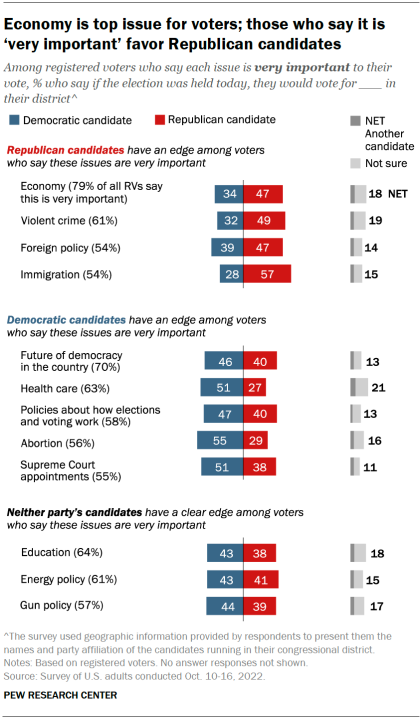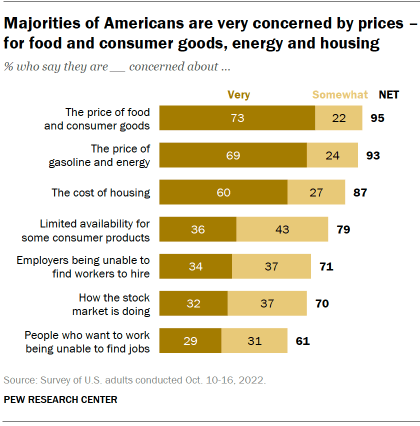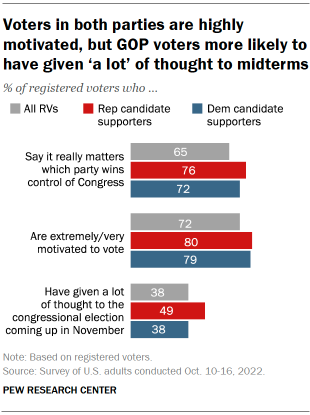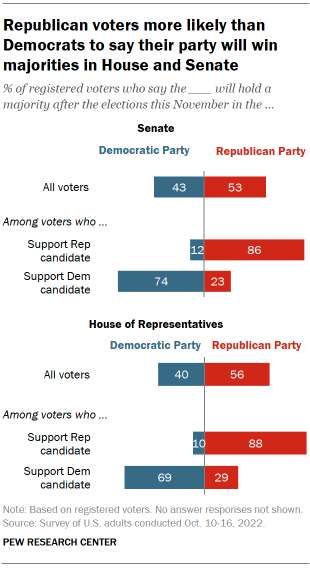Inflation continues to dominate Americans’ economic concerns
Pew Research Center conducted this study to understand the public’s views on the upcoming election, the importance of various issues, and the state of the national economy. For this analysis, we surveyed 5,098 adults, including 3,993 registered voters, from Oct. 10-16, 2022. Everyone who took part in this survey is a member of the Center’s American Trends Panel (ATP), an online survey panel that is recruited through national, random sampling of residential addresses. This way nearly all U.S. adults have a chance of selection. The survey is weighted to be representative of the U.S. adult population by gender, race, ethnicity, partisan affiliation, education and other categories. Read more about the ATP’s methodology.
Here are the questions used for the report and its methodology.

With less than three weeks to go until the midterm elections, registered voters’ preferences are nearly evenly divided: 41% say they favor the Democratic candidates in their districts, while a nearly identical percentage (40%) support Republican candidates; 18% are not sure how they will vote or favor candidates other than Republicans or Democrats. And those supporting GOP candidates are somewhat more engaged this election than their Democratic counterparts: They are more likely to have thought “a lot” about the election and to say the outcome “really matters.”
As has been the case all year, the economy is clearly the top issue for voters; fully 79% say it will be very important to their voting decisions – the highest share among 18 issues included on the survey. The public continues to take a dim view of current economic conditions. Just 17% of U.S. adults say the economy is in excellent or good shape, little changed from the 13% who said this in July.
Voters’ preferences vary widely depending upon the issues they prioritize. Among the wide majority rating the economy as very important, more support Republican candidates than Democratic candidates by double digits (47% to 34%). The GOP’s advantages among the narrower majorities of voters who view violent crime and immigration as very important are even wider (17 points and 29 points, respectively).
By contrast, registered voters who say abortion is very important favor Democrats over Republicans by nearly two-to-one (55% to 29%) and Democrats hold a wide lead among voters who prioritize health care (51% to 27%).
A sizable majority of voters (70%) say the “future of democracy in the country” is very important. Democrats hold a narrow lead among these voters: 46% support Democratic candidates, while 40% back Republican candidates.
There has been little change in voters’ priorities in recent months. The share who rate abortion as very important is unchanged since August, after rising sharply following the U.S. Supreme Court’s ruling that overturned Roe v. Wade.
The new national survey by Pew Research Center was conducted among 5,o98 adults, including 3,993 registered voters, from Oct. 10 to 16, 2022, on the Center’s nationally representative American Trends Panel.

The survey finds that inflation remains the dominant economic concern for Americans. In fact, the three top concerns, among seven items included, relate to prices – for food and consumer goods (73% are very concerned about this), gasoline and energy (69%) and the cost of housing (60%).
Far fewer express a high degree of concern about product shortages, employers being unable to find workers, the stock market’s performance or a shortage of jobs for people who want to work. The public’s economic concerns have shown little movement since the summer.
Concerns over prices are widely shared across demographic groups and income categories. And while Democrats and Democratic-leaning independents are less likely than Republicans and Republican leaners to be highly concerned about prices for food and consumer goods, sizable majorities of both Democrats (66%) and Republicans (81%) say they are very concerned.

With the overall midterm preferences of registered voters closely divided, nearly identical majorities of voters for candidates in both parties say they are “extremely” or “very” motivated to vote in the midterms; 80% of Republican backers say they are highly motivated, as do 79% of Democratic backers.
However, Republican voters are far more likely than Democratic voters to say they have “given a lot of thought” to the upcoming congressional elections (49% vs. 38%).
Overall, 65% of registered voters say it “really matters” which party wins control of Congress, including 76% of those who support Republican candidates and 72% of those who support Democrats. This is roughly on par with the 2018 midterms, when 66% of voters – including 74% of Republican voters and 75% of Democratic voters – said the outcome really mattered in a survey conducted about a month before the elections.
Among voters who are uncertain, or support another party’s candidates, just 28% say it really matters which party controls Congress. This group of voters is much less likely than Republican and Democratic voters to say they are motivated to vote and to report giving a lot of thought to the election.
Other important findings from the survey
Biden job approval in historical context. Currently, 38% of adults approve of Joe Biden’s job performance, while 59% disapprove. Biden’s approval rating is identical to Donald Trump’s at a comparable point in his presidency and lower than those of other recent presidents. (For more on evaluations of Biden compared with previous presidents, see “Biden’s job rating is similar to Trump’s but lower than that of other recent presidents.”)

Which party will control Congress? As was the case during past election campaigns, Republican and Democratic voters expect their parties will be successful after the Nov. 8 election. However, Republicans are more bullish than Democrats: 88% of those who support Republican candidates say their party will win a majority in the House, while 86% expect the GOP to gain a majority in the Senate. Among voters who favor Democratic candidates, 69% say their party will retain their House majority and somewhat more (74%) expect Democrats to retain control of the Senate.
Vast differences between Republican and Democratic voters on race, gender, other issues. Wide partisan differences in political attitudes are nothing new, but they are particularly striking when viewed by midterm voting preferences. For example, 79% of registered voters who favor Republican candidates say White people derive little or no benefit from societal advantages that Black people do not have; just 10% of Democratic voters say the same. And 76% of GOP voters – compared with 20% of Democratic voters – say the obstacles that have hindered women’s progress are now largely gone.
Candidates get low marks for explaining plans. Just 23% of registered voters say Republican candidates have done extremely or very well explaining their plans for the country, while 19% say the same about Democratic candidates.

While large majorities of voters in both parties say the opposing party has not done well in explaining their plans, fewer than half of voters who support Republicans (39%) say GOP candidates have done extremely or very well in explaining their plans; just 32% of Democratic voters say the same about Democratic candidates.




